Championship Manager 5
A game of two halves: the bits that work and the bits that don't.
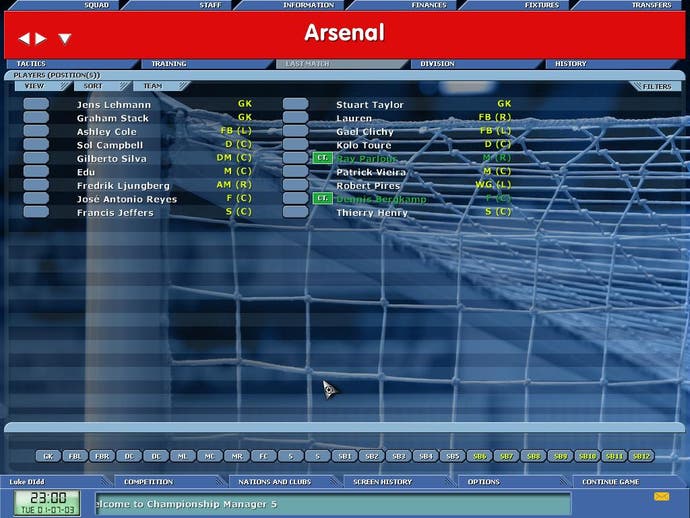
Forget three. Five is the magic number. Five Alive, Jackson Five, England 5 Germany 1, Five Live, The Famous Five, Ben Folds Five, Hawaii Five-O, Championship Manager 5. Actually, let's Take Five from this list, the cracks are beginning to show.
After our rather controversial Football Manager review where we somewhat emotionally slammed Eidos' plans to carry on the ChampMan brand without the game's creators, you might imagine a sour level of bias attached to this review, but not so. Yes, it's abundantly clear that we love Sports Interactive's efforts and wanted to rally behind its cause, but that doesn't mean we weren't prepared to give Beautiful Game Studios a fair crack of the whip. We just somewhat justifiably felt that continuing with the treasured brand name was maybe exploiting the less informed gamers out there, but that doesn't mean that it was impossible for BGS to create a game that addressed some of CM's shortcomings - but it was always a tall order.
The plan all along was to create a footy management sim that retained the depth of old but managed to make the experience less daunting to the newcomer and sped up the rather tardy process. To a large extent BGS has succeeded in doing so but has shot itself in the foot by releasing something which is painfully unfinished, full of bugs and features that evidently required a lot more polish and road testing than they've had.
A solid performance
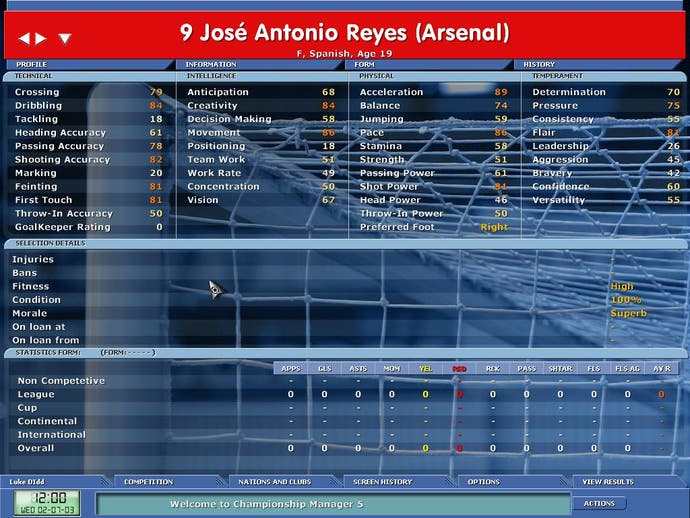
The basis of CM5 is actually surprisingly solid. After last summer's fairly embarrassing public unveiling (complete with "errr, whoops" 14-3 scorelines) the finished article is by some measure better than most of us expected. To the untrained eye it actually looks very good indeed. A bit like that promising youth prospect that comes off the bench every now and then, shakes things up, scores a late late winner and suddenly gets an unexpected run in the first eleven. But as we all know, exposed to the full ninety that promising flush of youth can often turn into an error strewn performance that rattles their confidence for good.
Apologies for the somewhat tedious analogy, but it does, sadly, apply to the rebirth of ChampMan. Forced to code the game from the ground up, BGS' efforts bare the hallmarks of all version 1.0s; good intentions, some great ideas on paper, but the net result is that the more you play it the more the game delivers its own unique brand of yellow card offences, blatant dives, own goals and gaffs appear to sully the suspension of disbelief. Rumour has it that a UEFA investigation is pending and a severe punishment is expected to be handed out, possibly banishing BGS to the stands and preventing them from conducting team talks and issuing instructions to the players during games. To be fair, the new signings tried their best, but the harsh truth is that they haven't had the time to gel and get used to the system and it's inevitable that mistakes were going to be made. As Hansen would say, you'll never win anything with kids.
To rewind slightly, BGS felt that getting hold of ChampMan would give it the chance to do something that Sports Interactive never really did. While SI essentially kept on revising what it had to the point where some fans felt it was becoming a bit of a bloated, behemoth of a game that proved too daunting for newcomers, BGS wanted to strip it down and almost reinvent it to become a more inclusive experience that hid away the layers of complexity and turned it into a game that was radically faster than before. The buzzword was "constant gameplay"; a lynchpin feature that enabled players to carry on navigating various parts of the game even when it was busy working out Copa America results and the endless number crunching that goes on behind the scenes.
Out of the traps
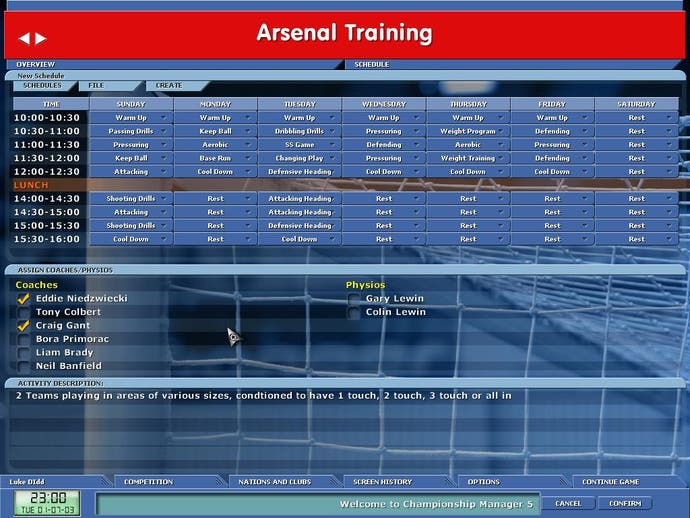
In those terms, CM5 is largely a roaring success, with the general play experience markedly quicker than SI's efforts and one that delivers on allowing the player to get on with poking about while the progress bar creeps up. There is still a degree of waiting around, though, with much of what you want to do still dependent on waiting for the next day to roll around. Plus, it's not always interesting or fun to have to constantly click through endless gossip and speculation before you reach a piece of news that's relevant to your team.
Whether you'll like the front end will be largely a matter of taste and preference, and it's interesting that despite owning the "look" of CM, BGS has still gone ahead and binned it anyway, which many will deem a mistake. Ditching CM's side bar entirely - going for a Firefox-inspired pull-down, tab-based system instead, which confuses initially but is evidently a clean, navigable front end once you get used to the transition - seems to have broken more than it has fixed. While most things in the same are intuitively placed and exactly where you'd expect them to be, it seems often simply designed to irritate the player. For example, it's more than a trifle irksome to not be able to see the 2D match engine and your team's stats overview at the same time. Basic stuff like this really starts to stick in your craw after a while, as does not being able to see the player's match rating andtheir current condition at the same time. For everything BGS has done to simplify the play experience it has introduced all-new barriers at the same time.
BGS has made bold boasts about its 'improved' 2D match engine, tilting it slightly to give the impression of height in the ball, but then has made the player blobs so big relative to the scale of the pitch that it's barely possible to figure out what's going on half the time, while the match engine speed settings are either pointlessly slow or way too fast to be able to keep up with the game. Why not put a speed slider in and let the player decide for themselves how fast they want it?
Out of control
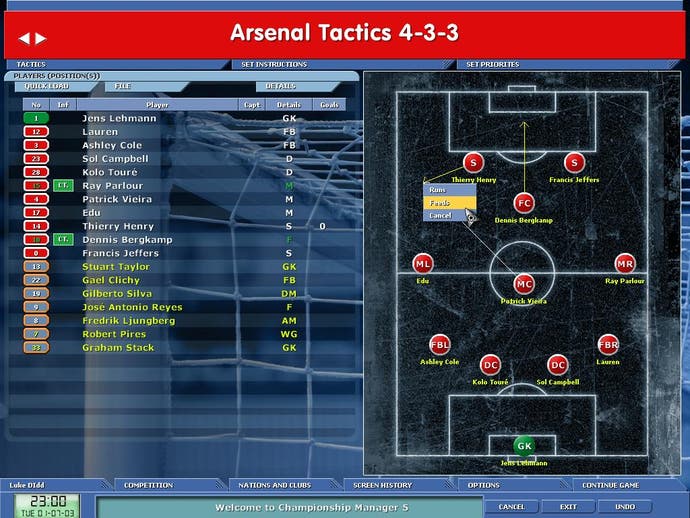
And what of the player AI? The game gives players the ability to issue a marvellous degree of customisable tactical instructions to players, but you'd be hard pressed to see any evidence of it from watching your team in action. Player runs, for example, are rarely in evidence, while sudden changes of tactics and formation make no discernable difference. It's like the placebo effect of gaming; give players a bunch of buttons to fiddle with and they feel like they're in control when they're not really. To make matters worse, a lot of the highlights seem to pick up on throw ins and free kicks way too much, while your alleged shot count mysteriously creeps up and up without there being much physical evidence of it - not that you can really see what's happening without matches taking forever to play out, anyway.
Frankly, we're more than a little puzzled with the standard of the realism in any case. Having taken charge of Norwich with the full expectation of going straight down, it seemed bizarrely easy to turn them into title contenders right from the word go, with some quite incredible results and one of the best defensive records in the land - and that's with an attacking approach too. It's the little things you begin to tire of; enormous shot counts that claim you've had 25 shots on target against top class opposition, while mediocre opponents down to nine men for much of the game prove to be the hardest opposition all season.
And for all CM5's sniggersome claims of having "accurate and impartial" Opta Index player data, why on earth do fringe players who struggle to make the starting eleven during an injury crisis end up being our star players while the real life stars seem to be rated as the reverse? Meanwhile crazy wage demands from players barely out of the youth team prevent you from sorting out contracts without bankrupting the club, while other players quickly become the subject of persistent and tiresomely repetitive transfer speculation even when you're given the chance to nip it in the bud.
Own goals and gaffs
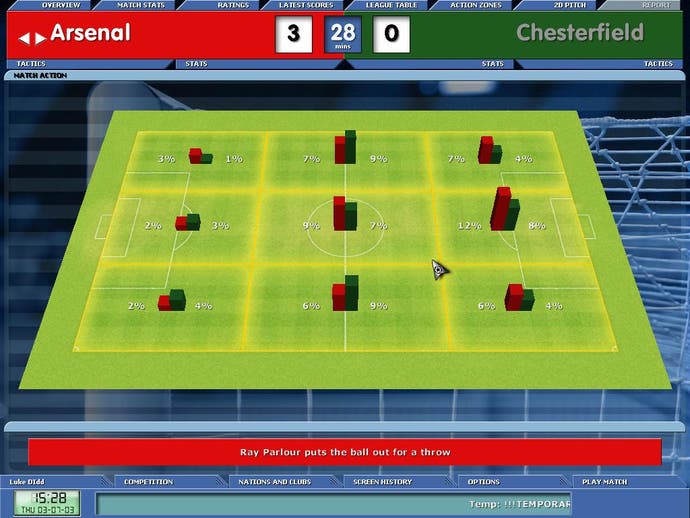
The little quirks and irritations are there for all to see and will be unique to the experiences of everyone that plays it. Some players have noted, for example, that the financial status of their favourite club is completely borked, while others have spotted hilarious wage gaffs for individual players - but literally anyone who looks at a Premiership youth team will be astonished to find they have half a dozen million-pound-rated 16-year old players kicking their heels while you busily meddle with a bunch of ageing journeymen complaining about their failing Achilles.
If the general spelling errors weren't enough to remind you of how rushed CM5 is, then the sight of the board repeatedly congratulating you on "2-0 draws" or griping that your league form has to improve after a five-match unbeaten run that's taken you to second in the table will have you hooting with derision. The best yet was when an anonymous youth product, aged 16, went to the media to complain about our managerial methods. For the love of God.
Of course, it's not strictly about the mistakes. CM5 is simply not at the races when it comes to comparing features. There are numerous (albeit minor) leagues missing, there's no network gaming option, and the media involvement is basic at best. It may have a few unique features of its own, but most of them are utterly meaningless - the nine 'action zones' the prime example. For the most part CM5 just lacks attention to detail, and in a game that attracts as many obsessives as this, that's a crucial error.
A well meaning underperformer
But if you're not all that bothered about some of the fairly harmless mistakes and whether or not obscure African leagues are there or not there's still a good management game lurking in there somewhere, and it is still quite good fun, believe it or not. It's just we thought we'd left behind this sort of buggy mess around the era of ChampMan 2. Somehow, despite itself it still emerges with some credit; it's not a disaster by any means and does, in fact, have the core of a decent alternative to SI's heavyweight efforts in there. For the most part it is arguably more accessible to the newcomer; it's much quicker, does all the basic stuff reasonably proficiently, but just needed about another six months in development to realise some of its ambitions. The truth is the game was already five months late and Eidos couldn't afford to wait that long, but in bringing the game to market undercooked may have irreparably harmed the brands' chances of retaining its title of king of the footy management sims. As things stands, there's only one game in the genre worth devoting your life to, and we don't need to remind you what that is...

